|
 
IN
THE NEWS | CALENDAR
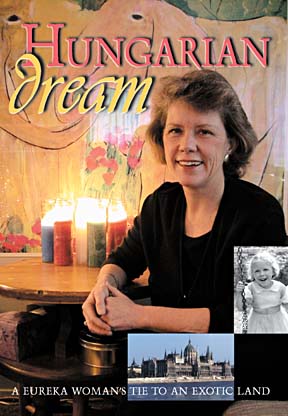
Louisa Rogers in her Old Town
Eureka home. Photo by Katie O'Neill.
Inset of Rogers on a swing in her backyard in Budapest, 1957,
and the Hungarian Parliament buildings today.
by LOUISA
ROGERS
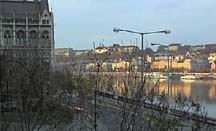 
[Recent scenes of the Danube
and the "Buda" side of the city.]
TO A 5-YEAR-OLD PEEKING OUT
THE WINDOWS of the U.S. Embassy, the tanks looked terrifying
as they rumbled down cobblestone streets. Gunfire echoed off
bullet-torn buildings; rubble lay in piles on the ground. The
5-year-old was myself, the place Budapest, the year 1956.
Forty-seven years later, on
a crisp November morning, I stood on a grassy square in front
of the Hungarian Parliament buildings, where one of the first
attempts by a small satellite nation to free itself from Soviet
rule took place. Huge black-and-white photographs depicting the
fighting of '56 were mounted on display. The sun shone brightly;
the Danube was just visible past the Parliament buildings. It
was hard to believe this lovely spot had been the location of
such violence.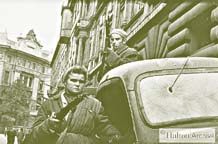 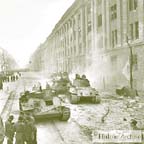
I was back in Budapest to pursue
a dream: to apply the business skills I teach at home to this
post-Communist society. Thirteen years after gaining independence
from the USSR, Hungary is poised to join the European Union in
2004. My long-term goal was to train Hungarian businesspeople
in management skills and customer service. This week, I hoped
to make contacts and scope out possibilities.
[Left, two Hungarian
"freedom fighters" bearing arms in Budapest. The term
referred to Hungarians fighting against the Soviet takeover.
Time Magazine's January
1957 "Man of the Year" issue was dedicated to them.
Right, Budapest during the Soviet suppression of the Hungarian
revolt. Photos from the Hulton Archive.]
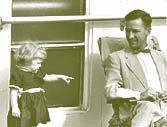 My
father, an American diplomat, was assigned to Budapest for four
years in the `50s. We lived there during turbulent times before,
during and after the Hungarian Revolution. It was an experience
that had a deep emotional impact on my parents and my family,
and ever since I have felt a connection with Hungary. It was
not my first time back; in the summer of 1986 my husband and
I bicycled across Europe and stayed in Budapest with my former
kindergarten teacher, a family friend. My
father, an American diplomat, was assigned to Budapest for four
years in the `50s. We lived there during turbulent times before,
during and after the Hungarian Revolution. It was an experience
that had a deep emotional impact on my parents and my family,
and ever since I have felt a connection with Hungary. It was
not my first time back; in the summer of 1986 my husband and
I bicycled across Europe and stayed in Budapest with my former
kindergarten teacher, a family friend.
[Left, Louisa Rogers
and her diplomat father on board an ocean liner from New York
to Le Havre, France, in 1953. State Department employees traveled
by ship which was cheaper than flying until the mid-'60s.
From there the family drove across Europe in their station wagon,
sent on the same ship, to Hungary.]
Before leaving Eureka for my
latest trip, I surfed the Web and found the sites for the American,
Canadian and British chambers of commerce; two English-language
newspapers in Budapest; and several business organizations. I
e-mailed the contacts, introducing myself, and heard back from
a few of them not as many as I had hoped. I was going to have
to invest more sweat equity than a simple e-mail to impress them.
EMBASSY NOW A FORTRESS
My old friend Bill, with whom
I would stay, picked me up at the airport. He is the site security
manager at the U.S. Embassy. In the taxi, he explained how, since
9/11, the U.S. government has been "dumping concrete"
all over its embassies. Indeed, when he showed me the building,
it looked like a fortress surrounded by a moat of concrete. Construction
consumed the entire block and apparently annoyed the neighbors.
Hungarians who want a visa to the United States have to wait
under open skies across the street until they hear their name
bellowed through a PA system. Then they navigate a succession
of outer checkpoints before entering the building.
Inside, Bill waited while I
showed the Marine on duty my passport. I peered around, remembering
fleeting images from the week I had lived in this building as
a child. The families of U.S. diplomats decamped to the
embassy for several days during the first stage of fighting.
To the 30-odd kids, it was a party. We got to sleep on mattresses
in our daddies' offices, eat in the cafeteria and have a Halloween
party. It was no picnic for the adults, however. There was only
one hot plate to cook on. And a week later, when the fighting
intensified, we were evacuated to Vienna. In the middle of a
snowstorm, visibility near zero, my father led a convoy to the
border where we were stopped by the Russian military and forbidden
to cross. (My father only turned around after a Russian soldier
pointed a rifle at him.) Local townspeople put us up in a schoolhouse,
where we children acted out the events we had witnessed that
day; one boy played the role of border guard while the rest of
us lined up to cross. The story of a group of American
kids playing a pretend game while in the midst of fleeing Hungary
made headlines in the United States. The next day, the Russians
allowed us to leave the country.
Today, the threat of communism
seems a distant ghost, and many might look back on it as absurdly
exaggerated. But it was very real the two superpowers, after
all, came to the brink of a nuclear exchange during the Cuban
Missile Crisis in 1962. In Hungary in the mid-'50s, the Red Army
was literally just over the horizon; so when the October 1956
uprising broke out, the hard fact of the matter was that no Western
country, not even the United States, was in a position to rush
in and help. For a few days, amazingly, it looked like the revolution
would triumph. Then the Soviet tanks came, crushed the uprising
and installed a puppet regime. "The Hungarian Revolution
seized the world's awareness as no other event of that period
did," my father told me once. "Thousands of Hungarians
left and were taken in by Europeans and by the U.S."
As Bill and I walked around
the embassy, I remembered a vivid scene: Our noses pressed to
the window on a gray afternoon, my sisters and I gazed out at
a crowd of people in faded jackets and berets, standing in front
of the embassy and singing the Hungarian national anthem. Though
I was only 5, I was deeply stirred by their emotion. "They're
asking for our help," my father explained. My oldest sister
wrote this letter:
Dec. 5, 1956
Dear President Eisenhower,
I am Elinor Rogers, 8. My
father is a diplomat and we live in Budapest, Hungary, Europe.
On Oct. 31 a band of Hungarians gathered in front of the embassy
and began crying something. Daddy said we couldn't help because
our army was in America. Europe is our fellow country and you
should help her if she is in danger. Even if you came halfway
across the country and then lost, you would at least have glory.
I wish America wasn't so rich. I wish I could give some of America's
richness to Europe, so they would be even. Europe will never
be friends with America, if you don't help now. Please do. If
you don't, I'll never like you again.
Elinor
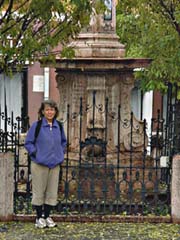 KEEPING
UP APPEARANCES KEEPING
UP APPEARANCES
On Sunday, the day after I arrived,
Bill and I visited his friend Katalin on the other side of the
Danube. Budapest is built around a river; Buda is the hilly,
mostly residential side; Pest is the commercial center. The city
looks and feels like a quieter, gentler Paris. "Europe's
best-kept secret," I read in a tourist brochure.
When we arrived at her home,
I was relieved that I had changed out of my Humboldt casuals
and dressed up, at least minimally; like most Europeans, Katalin
dressed elegantly even in casual moments. A bilingual woman with
an adult son living in New York, she owned a business leading
cultural and historical tours for Americans and other English
speakers in Budapest. She poured me Hungarian wi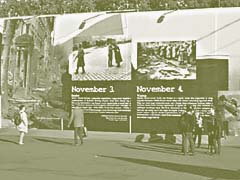 ne
in a long-stemmed glass and we sat in her living room, discussing
possible contacts. Bill had told me she had money worries, but
I would never have guessed. Her clothes and furniture looked
much more upscale than mine. But I remembered from family stories
that Hungarians have a great deal of pride. ne
in a long-stemmed glass and we sat in her living room, discussing
possible contacts. Bill had told me she had money worries, but
I would never have guessed. Her clothes and furniture looked
much more upscale than mine. But I remembered from family stories
that Hungarians have a great deal of pride.
[Left, Rogers,
standing in front of the monument in Szent Entendre (Saint Andrews)
Square. Right, pedestrians in downtown Budapest view posters
of the events of 1956 .]
The next morning, at the Budapest
Breakfast Networking Organization, 12 of us met in the private
room of a restaurant, eating eggs and toast and Hungarian sausage.
The director, Paul, was a former executive from Manchester, England,
who had launched two networking groups in Budapest: this one
in English, another in Hungarian. One by one, we introduced ourselves.
Our group consisted of the director of an executive search firm,
the owner of a mystery shopper service, an attorney/mediator,
several marketing consultants, a magazine photographer, an owner
of an espresso cafe, and an owner of a chocolate and candy shop.
Besides the Hungarian members, there were several Brits, one
American and an Italian in the group.
This week it was Brendan's turn
to give a 10-minute presentation on his marketing business. After
his talk, the discussion veered into customer service, which
is lacking in Hungary. "I would market customer service
in the context of cultural change if I were you," said Brendan,
a Briton. "How do you encourage change in a people who have
been told what to do for more than 50 years, and robbed of any
initiative? There's a need for customer service, but the bigger
issue is cultural change."
"How to bring about change
without losing control," Paul said. "Many managers
are afraid of being exposed as unknowledgeable. Their autocratic
management style covers up this fear. There's a Hungarian saying:
`God made the earth in six days and rested on the seventh. On
the eighth day along came a Hungarian who corrected God's mistakes.'"
Peter, director of the executive
search firm, came up to me and suggested we refer clients to
each other. I didn't want to discourage possible business, but
a reality check seemed only fair. I told him I was willing, but
it was unlikely to happen often. It's not as though I regularly
run into people in Humboldt County who are relocating to Hungary.
Nadas, the attorney, offered
to help with contracts if I set up trainings in Hungary. I had
been advised to be very careful with contracts. Along with poor
customer service, there were widespread problems with business
ethics. I remembered what Ernie Nagy, my father's friend and
Embassy colleague, had said about the revolution: "What
set it apart from all others was its near perfect purity: no
looting and almost total unanimity of purpose." It sounded,
sadly, like times had changed.
SERVICE, ANYONE?
Every day, an early morning
constitutional. Bill and I would leave the apartment, head over
to the Margit Bridge, then walk the length of Margit Island,
which lies between the two halves of the city. We'd walk along
the gravel-jogging path, past the thermal baths, watching the
sunrise through the linden trees.
And every day, a meeting. On
Tuesday I had lunch at the Iguana, an American-owned Mexican
restaurant, with Shar, the president of NAWA, the North American
Women's Association, whom I had found on the Internet before
arriving. Shar brought along Sue, a Canadian from Ottawa married
to a "'56er," the phrase for Hungarians who lived through
the revolution. I explained my goal: to offer trainings in Budapest,
returning two or three times a year, not relocating.
Sue took a generous bite of
burrito. "I just don't get it," she said. "I don't
see how you can make it work from a distance."
"How will you do follow-up?"
Shar asked. "Hungary isn't like the States or Canada, where
the concept of customer service is wired into us. I don't think
you can offer customer service in two or three hours and expect
it to stick."
The problem does indeed run
deep. During my 1986 visit, I was sitting at a Budapest cafe
with a friend and waved at the waiter, trying to get his attention.
My companion laughed at me, explaining that, if anything, my
gesture would put the waiter off. Since communism tried to eliminate
the profit motive, the concept of service, that the customer
comes first and should be attended to, was alien. There was simply
no economic incentive to do so.
Clearly, that is is still a
problem today. All week I heard a litany of the terrible quality
of customer service. Even multinational corporations with record
sales had trouble maintaining high customer service in Hungary.
Consulting firms offered customer-service trainings, but they
didn't seem to have a lasting effect. I wondered how I could
use this problem to my business advantage.
That evening, Zsuzsa, Bill's
Hungarian language tutor, dropped by. Yet another well-dressed
woman, she was decked out in a wool suit, neck scarf, costume
jewelry and high heels. We sat on the couch talking away like
old friends. She told me she'd love to move to the United States
but didn't have connections. Several of her family members had
health problems, and she couldn't abandon her aging mother. I
could picture her in the States: one of those indefatigable immigrants,
willing to work hard, thrilled by the structural and psychological
freedoms the United States offers.
"Do you speak any Hungarian?"
Zsuzsa asked.
"Igen," I said, meaning
"yes." Then I broke into English: "I remember
four words: `yes,' `no,' and `watch out.'"
"When you come back, I
will give you a lesson."
Like many middle-aged Hungarian
women, Zsuzsa was divorced. She talked openly about her ex-husband's
infidelity, which is common in Hungary. She blamed it on communism.
Women were forced to go to work too early, in her opinion, before
they were ready. They worked for totalitarian bosses who exacted
sexual favors. Home didn't offer much of a positive alternative
alcoholism and domestic violence were also common. Hungary has
the highest rate of alcoholism in Central Europe, and until 10
years ago, the highest suicide rate in the world. Although it
has declined, it is still high.
TWIN CRISES
The next morning I left the
apartment early. It was still dark, but I felt no danger. I felt
elated on the streets of Budapest, walking in the lee of old
stone buildings, hearing the chug of trams, crossing the Danube
along one of several bridges. As I reached a major avenue, I
suddenly realized it was the street my father had written about:
Anton and I left the embassy
as dusk was falling, to be home before dark, and drove slowly
down Bajcsy-Zsilinszki ut (street), which was bristling with
tanks. We were the only civilian traffic. At the bridge, the
Russian and Hungarian army patrols checked our papers and permitted
us, as diplomats, to pass. Then we eased between two tanks. I
suppose it is easy to describe the face of the enemy they seem
usually to be called `glowering' or `threatening' and it is true
these soldiers certainly did not give any impression of camaraderie.
But who can describe another's inner feelings at such a time?
Some Russians defected during the revolution. Perhaps our `threatening
Mongol' was one. Did he think he was standing on a Nile bridge,
or in Berlin, instead of over the Danube? And the Hungarian soldier
what did he do the day before and the day after? How did he come
to find himself patrolling side by side with the hated enemy
that his countrymen, with a unity unknown in their entire history,
had just risen against? On the other hand, I suppose one has
to give his momentary impressions of the enemy, subjective though
these be. I never saw a pro-Soviet force during the revolution
man or tank which struck me as anything but hostile and threatening.
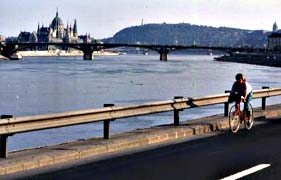 My
father's reference to the Nile was no accident. On an earlier
trip to Budapest, my former kindergarten teacher described her
run-in one night during the revolution with a Russian soldier
who asked her for a cigarette. As she gave him one, he gestured
toward the river and asked, "Suez?" Russian conscripts
had been told they were going to Egypt. Why? Because at the very
same time Hungarians were rising up, Israeli brigades, backed
by the English and the French, invaded the Suez Canal. The goal
was to thwart Egyptian president Gamal Abdel Nasser's attempt
to nationalize the strategically vital transportation corridor,
but it backfired after the Soviet Union threatened to intervene
and after President Eisenhower condemned the attack. My
father's reference to the Nile was no accident. On an earlier
trip to Budapest, my former kindergarten teacher described her
run-in one night during the revolution with a Russian soldier
who asked her for a cigarette. As she gave him one, he gestured
toward the river and asked, "Suez?" Russian conscripts
had been told they were going to Egypt. Why? Because at the very
same time Hungarians were rising up, Israeli brigades, backed
by the English and the French, invaded the Suez Canal. The goal
was to thwart Egyptian president Gamal Abdel Nasser's attempt
to nationalize the strategically vital transportation corridor,
but it backfired after the Soviet Union threatened to intervene
and after President Eisenhower condemned the attack.
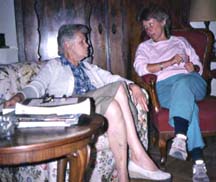 [Above, Rogers on her bicycle in Budapest,
Aug. 1986. At left, the author, and her kindergarten teacher,
left, Thekla Liptay-Wagner.] [Above, Rogers on her bicycle in Budapest,
Aug. 1986. At left, the author, and her kindergarten teacher,
left, Thekla Liptay-Wagner.]
NETWORKING
Later, I hopped on the tram
to cross the river. The Soviets invested heavily in public transportation,
leaving Budapest with a fine tram and subway system whose tentacles
spread far. This afternoon I was meeting Willy Benko, the managing
director of Euronet, a company that makes cash-dispensing machines
in Europe, and the man known as "Hungary's motivational
speaker." I was pleased he was willing to meet me. In fact,
everyone seemed willing to meet me. Why? All right, I was American,
but "Eureka" is not exactly on the map. Perhaps the
fact that I was there for only a week? But if I were to arrive
in, say, Atlanta, and announce, "I'm here for a week,"
I couldn't imagine people necessarily opening doors.
We sat in the company conference
room, drinking coffee in china cups, with delicate ginger cookies
presented on a silver tray. Willy turned out to be another bilingual,
had lived in Texas and knew Dr. Phil. He was the speaker every
month at the "Budapest Power Lunch." He had also launched
Hungary's only Toastmasters club.
"What's your main topic
at the power lunch?" I asked.
"Personal responsibility.
You can't talk enough about that here. In Hungary, failure is
not an option. If mistakes happen, they are always someone else's
fault."
"I've worked with a lot
of companies in the states where the same thing is true,"
I said.
"Yeah, but it's a matter
of degree. If Hungary is going to succeed in the European Union,
we have to overcome the old mind-set. We've had 13 years of independence,
but we have a long way to go."
During the week, I decided to
attend the "Big Smoke Executive Cigar Club Networking Event,"
held at a local bar, sponsored by the Budapest Business Journal
and the Hungary Tobacco Institute. Evidently Hungary hadn't joined
the anti-smoking bandwagon yet. I wasn't thrilled by the thought
of an evening of cigars, but I dropped by the business journal's
office to sign up anything for the cause. The young male clerk
at the desk shook his head, saying, "I'm sorry, but this
event is for executives only."
"I am the executive
of my company," I said, filling every inch of my 5'1"
frame.
"Oh, I'm sorry," he
said, and signed me up.
At the bar, I arrived early,
and forced myself to go up to a man who turned out to be from
neighboring Slovakia. Networking is always a bit awkward in the
beginning, but it was easier in Hungary. From that moment on,
the conversations didn't stop. I met business owners, high-level
managers, and journalists, mostly men, a few women. By the end
of the evening my clothes had a smoky flavor, but didn't reek.
I didn't sample a cigar. Few people did.
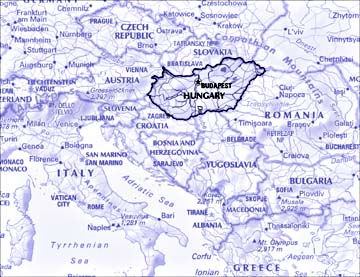 A NEW REVOLUTION A NEW REVOLUTION
My networking produced some
tangible results: The Budapest Business Journal, published
by a guy from Philadelphia, will run my business column; I've
been invited to be a guest speaker at the power lunch; and the
Central European University, which acts as a broker to companies
requesting trainings, will recommend me when they have a request
for an English-speaking trainer.
It's a start. I would love to
fulfill my dream, and be invited back two or three times a year
all expenses paid, of course. But whether that transpires or
not, my week in Budapest was worth every moment. Nothing stirs
my sense of vitality more than taking action on a dream. I can't
really understand or empathize with the depth of change asked
of Hungarians in this time; I've never had to face the kind of
changes they face. But I respect the challenges in front of them,
and if I can be a part of their new revolution, I would consider
it a privilege.
Louisa Rogers is a Eureka-based
business trainer and coach who specializes in customer service,
management skills and communication
in the workplace.
IN
THE NEWS | CALENDAR
Comments?

© Copyright 2004, North Coast Journal,
Inc.
|






 My
father, an American diplomat, was assigned to Budapest for four
years in the `50s. We lived there during turbulent times before,
during and after the Hungarian Revolution. It was an experience
that had a deep emotional impact on my parents and my family,
and ever since I have felt a connection with Hungary. It was
not my first time back; in the summer of 1986 my husband and
I bicycled across Europe and stayed in Budapest with my former
kindergarten teacher, a family friend.
My
father, an American diplomat, was assigned to Budapest for four
years in the `50s. We lived there during turbulent times before,
during and after the Hungarian Revolution. It was an experience
that had a deep emotional impact on my parents and my family,
and ever since I have felt a connection with Hungary. It was
not my first time back; in the summer of 1986 my husband and
I bicycled across Europe and stayed in Budapest with my former
kindergarten teacher, a family friend. KEEPING
UP APPEARANCES
KEEPING
UP APPEARANCES ne
in a long-stemmed glass and we sat in her living room, discussing
possible contacts. Bill had told me she had money worries, but
I would never have guessed. Her clothes and furniture looked
much more upscale than mine. But I remembered from family stories
that Hungarians have a great deal of pride.
ne
in a long-stemmed glass and we sat in her living room, discussing
possible contacts. Bill had told me she had money worries, but
I would never have guessed. Her clothes and furniture looked
much more upscale than mine. But I remembered from family stories
that Hungarians have a great deal of pride. My
father's reference to the Nile was no accident. On an earlier
trip to Budapest, my former kindergarten teacher described her
run-in one night during the revolution with a Russian soldier
who asked her for a cigarette. As she gave him one, he gestured
toward the river and asked, "Suez?" Russian conscripts
had been told they were going to Egypt. Why? Because at the very
same time Hungarians were rising up, Israeli brigades, backed
by the English and the French, invaded the Suez Canal. The goal
was to thwart Egyptian president Gamal Abdel Nasser's attempt
to nationalize the strategically vital transportation corridor,
but it backfired after the Soviet Union threatened to intervene
and after President Eisenhower condemned the attack.
My
father's reference to the Nile was no accident. On an earlier
trip to Budapest, my former kindergarten teacher described her
run-in one night during the revolution with a Russian soldier
who asked her for a cigarette. As she gave him one, he gestured
toward the river and asked, "Suez?" Russian conscripts
had been told they were going to Egypt. Why? Because at the very
same time Hungarians were rising up, Israeli brigades, backed
by the English and the French, invaded the Suez Canal. The goal
was to thwart Egyptian president Gamal Abdel Nasser's attempt
to nationalize the strategically vital transportation corridor,
but it backfired after the Soviet Union threatened to intervene
and after President Eisenhower condemned the attack. [Above, Rogers on her bicycle in Budapest,
Aug. 1986. At left, the author, and her kindergarten teacher,
left, Thekla Liptay-Wagner.]
[Above, Rogers on her bicycle in Budapest,
Aug. 1986. At left, the author, and her kindergarten teacher,
left, Thekla Liptay-Wagner.] A NEW REVOLUTION
A NEW REVOLUTION